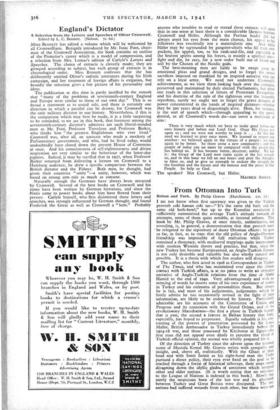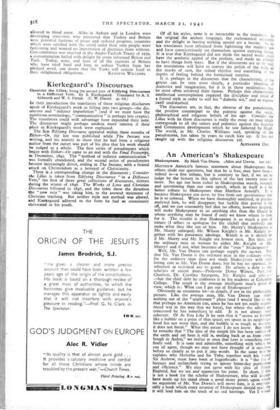From Ottoman Into Turk
Briton and Turk. By Philip Graves (Hutchinson. 12s. 6d.)
I no not know when first currency_ was given to the Turkish proverb eski haman eski tas—"It's the same old bath and the same old bath-bowl," but up to the Kemalisf revolution it sufficiently summarised the average Turk's attitude towards all attempts, some of them quite notable, at internal reform. This book by Mr. Philip Graves, at once timely, authoritative, and revealing, is, in general, a demonstration that that proverb must be relegated to the repository of dusty Ottoman effects : he goes so far, in fact, as to state that the' old policy of Anglo-Ottoman friendship was impossible of full realisation -while Turkey remained a theocracy, with mediaeval trappings quite inconsonant with modem Western theory and practice, but that, since the new Turkey has become Europeanised, an Anglo-Turkish Entente is not only desirable and valuable but also wholly natural and possible. It is a thesis with which few readers will disagree.
The author, who first acted in 1908 as Correspondent in Turkey of The Times, and who has maintained ever since the closest contact with Turkish affairs, is at no pains to write an objective narrative of Anglo-Turkish relations from the time of Abdul Hamid to the end of isogo. Very advantageously and with no mincing of words he inserts some of his own experience of events in Turkey and his estimates of personalities there. But always he is fair, and most of his judgements, judgements which he freely admits he has occasionally revised in the light of later information, are likely to be endorsed by history. Particularly admirable are his accounts of the Committee of Union and Progress and its connexion with the Grand Orient, and of the revolutionary Macedonians—the first a phase in Turkish history that is past, the second a feature in Balkan history that Italy, especially, has hoped to perpetuate. Equally valuable is his con- trasting of the powers of penetration possessed by Sir Louis Mallet, British Ambassador in Turkey immediately before the 194-18 war, and those possessed by Kitchener in Egypt—the first man did not appear even dimly to perceive the trend of Turkish official opinion, the second was wholly prepared for it Of the direction of Turkey since the advent upon the national scene of Mustafa Kemal Mr. Graves writes with sympathy and insight, and, above all, realistically. With the Ghazi at their head and with Ismit Intinil as his right-hand man the Turks pursued a direct policy, their eyes ever fixed on the goal to be reached through a forest of historical—arborage, their steps never- divagating down the idyllic glades of sentiment which temPted other and older nations. (It is worth noting that no reference to the League of Nations is indexed in this book.) Slowly but surely the suspicions born of the last war and its aftermath between Turkey and Great Britain were dissipated. The tsee nations had suffered wounds from each other, but these were 12°I
allowed to bleed anew. Alike in Ankara and in London were developing statesmen who perceived that Turkey and Britain were potential bastions of peace and ordered progress, countries which were satisfied with the social order their own people were fashioning and wanted no importation of doctrines from without. Consummation was reached in the Anglo-Turkish Treaty of 1939, a consummation hailed with delight by every informed Briton and Turk. Today, none, and least of all the enemies of Britain who have tried hard and long to seduce Turkey from her pledged word, can doubt that the Turks will remain loyal to







































 Previous page
Previous page